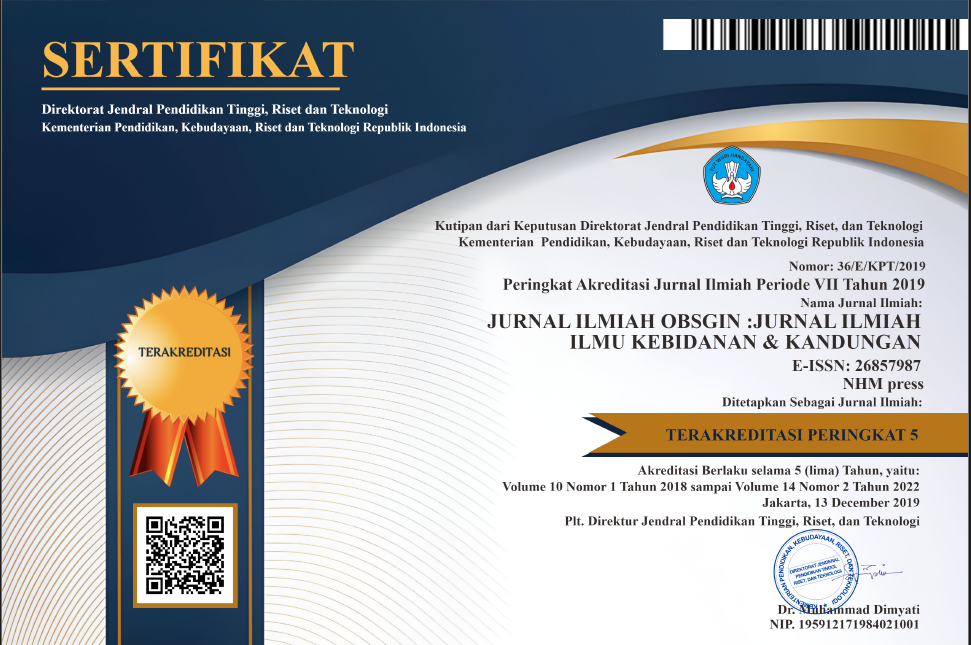HUBUNGAN TINGKAT PENGETAHUAN IBU TENTANG KB IUD DENGAN KEJADIAN UNMET NEED AKSEPTOR IUD di PMB USROTUL KARIMAH YOSOWILANGUN
Abstract
To meet the goals of the Sustainable Development Goals (SDGs), many countries have implemented programs to reduce unmet needs, provide pregnancy services and ensure that childbirth is assisted by trained health personnel. Unmet need is one of the indicators that has a history of more than four decades at the international level in expanding policies and programmes for PUS to regulate their fertility. The purpose of this research is to find out the relationship of the level of knowledge of Mother about Kb IUD with the occurrence of Unmet Need Acceptor IUD in Pmb Usrotul Karimah Yosowilangun. This research is a quantitative type with cross sectional design that will be carried out in April 2024. The population of this study is PUS user KB IUD/non IUD who visited the PMB Usrotul Karimah Yosowilangun Lumajang with a sample of 36 respondents. The data used is univariate and bivariate with the first search for chisquare and analyzed using contingency coefficient test with the help of software SPSS v.29. Based on the univarian analysis obtained most of the mother has a good level of knowledge (66.7%), sufficient knowledge is (27.8%), and (5.6%) less accuracy. This study showed that there was a relationship between the level of knowledge of the mother about the IUD with the unmet need IUD Acceptor events. That means that the mother who has a good knowledge level about IUD is more influential compared to the mother whose knowledge level is less about KB IUD against the unmeasurable need of IUD acceptors in PMB Usrotul Karimah Yosowilangun.
References
Arikunto, S. (2013). Prosedur Penelitian: Suatu Pendekatan Praktik. Jakarta: Rineka Cipta.
BKKBN 2013, Buku Panduan Praktis Pelayanan Kontrasepsi, P.T Bina Pustaka Sarwono Prawirohardjo, Jakarta.
BKKBN Jatim. 2015. Cara-Cara Kontrasepsi Yang Digunakan Dewasa Ini. Diakses: 23 April 2015. http://www.bkkbn-jatim.go.id/.
BKKBN. (2020). Badan Kependudukan Keluarga Berencana Nasional. In Survei Demografi dan Kesehatan Indonesia.
Christiani, C., Tedjo, P., & Martono, B. (2014). Analisis Dampak Kepadatan Penduduk terhadap Kualitas Hidup Masyarakat Provinsi Jawa Tengah. Serat Acitya-Jurnal Ilmiah UNTAG Semarang, 102-103 Https://home-edukasi.blogspot.com/2013/05/skor-pilihan-ganda.html
Kemenkes RI. 2014. Profil Kesehatan Indonesia Tahun 2014. Jakarta: Kementerian Kesehatan RI
Kusumaningrum, A. T. 2017. Hubungan Peran Suami dengan Ketepatan Waktu Penggunaan Kontrasepsi Pascasalin pada Ibu Menyusui.SuryaSTIKes Muhammadiyah Lamongan9(1): 29-37
Listyaningsih, U, Sumini & Satiti Sonyaruri 2016, ‘Unmet need: Konsep yang Masih Perlu Diperdebatkan’, Universitas Gadjah Mada, vol.24, no.1, hal. 72-90.
Nikmawati, N. 2017. Faktor- faktor yang berhubungan dengan Penggunaan Metode Kontrasepsi Jangka Panjang. Jurnal Kebidanan 6(12): 39-49.
Porouw, HS 2015, ‘Faktor-Faktor yang Berhubungan dengan Kebutuhan Keluarga Berencana yang tidak Terpenuhi (Unmet need) di Kecamatan Sipatan Kota Gorontalo, Jurnal Kesehatan, vol.5, no.4
Rahayu, E. W. 2015. Pengaruh Konseling Keluarga Berencana Terhadap Tingkat Pengetahuan dan Minat Menjadi Akseptor Keluarga Berencana Pasca Persalinan di Puskesmas Mlati II Yogyakarta. Skripsi.
Rizkitama, A. 2015. Hubungan Pengetahuan, Persepsi, Sosial Budaya dengan Peran Aktif Pria Dalam Vasektomi di Kecamatan Paguyangan Kabupaten Brebes Tahun 2011-2012. Unnes Journal of Public Health.
Saifudin.A.Bari, Keluarga Berencana dan Kontrsepsi.Jakarta. PustakaSinar Harapan. Jakarta. 2013
Sariyati, S, Mulyaningsih, S & Sugiharti, S 2015, ‘Faktor yang Berhubungan dengan Terjadinya Unmet need KB pada Pasangan Usia Subur (PUS) di Kota Yogyakarta’, Journal Ners And Midwifery Indonesia, vol. 3, no. 3, hh. 123-128
Sugiyono. 201. Metode Penelitian Kuantitatif Kualitatif dan R&B. Bandung: Alfabeta.
Uljanah, K, Winarni, S & Mawarni, A 2016, ‘Hubungan Faktor Risiko Kejadian Unmet need KB (Keluarga Berencana) di desa Adiwerna, Kecamatan Adiwerna, Kabupaten Tegal, Triwulan III tahun 2016’, Jurnal Kesehatan Masyarakat, vol,4, no,4.
WHO. 2020. Constitution of the World Health Organization edisi ke-49. Jenewa:. hlm. 1. ISBN 978-92-4-000051-3
Wijayanti, R & Novianti 2017, ‘Penggunaan KB Metode Kontrasepsi Jangka Panjang (MKJP) Di Wilayah Kerja Puskesmas Kecamatan Sawah Besar Jakarta Pusat’, Jurnal Ilmiah WIDYA, Vol. 4, diakses 22 Juli 2018. http://e-journal.jurwidyakop3.com/index.php/jurnal-ilmiah/article/view/284.











